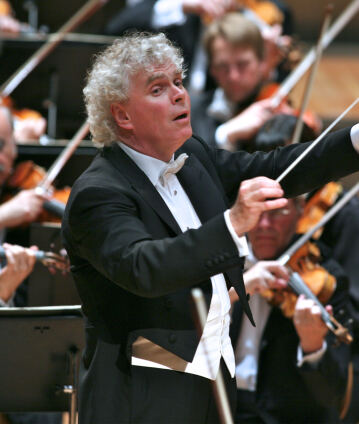Simon Rattle conducts Bruckner’s Ninth and Schreker’s Chamber Symphony

Two Austrian composers, two sonorous symphonies on the threshold between late Romanticism and modernism: that is the programmatic concept of this concert with Simon Rattle. Along with Anton Bruckner’s unfinished Ninth Symphony we hear the seductively iridescent Chamber Symphony by Franz Schreker – a composer who was celebrated during his lifetime but is an insider’s tip today.
Anton Bruckner did not quite reach the – since Beethoven – magical boundary of nine completed symphonies. For him as well, the Ninth, which, like Beethoven’s, is in D minor, was to remain his last symphony; despite a complete outline and extensive sketch material, the composer was nevertheless unable to finish the Finale. Thus, Bruckner’s symphonic legacy, which he dedicated to the “beloved God”, contrary to every tradition ended with a slow movement – and then in the “wrong” key of E major.
Although the work complies with the strict thematic and dramaturgical architecture we know from the composer’s earlier symphonies, at the same time the far more radical and, in passages, shockingly dissonant harmony seems to fling the door to modernism wide open. Sir Simon Rattle and the Berliner Philharmoniker performed the symphony here in the three-movement version (before presenting a reconstructed completion of the last movement from the sketches in 2012).
Whereas Anton Bruckner suffered from a lack of public recognition all his life and was not acknowledged as one of the most important composers until after his death, the situation of his Austrian countryman Franz Schreker was just the opposite. After the phenomenal success of his operas, in particular, he was almost completely forgotten when the National Socialists came to power. Deprived of his positions by the new regime, the composer died in Berlin in 1934. Not until the 1970s did a Schreker renaissance begin, which led to a rediscovery of both his operas and instrumental works.
The Chamber Symphony, which was composed in 1916 for an anniversary of the Vienna Academy of Music and Performing Arts, shows Schreker at the height of his seductively dazzling artistry. As a master of transition, the composer allows his thematic inspirations to develop through variations. The traditional sequence of movements is still recognizable, but flows together in a single stream of sound. Simon Rattle conducts the work with the Karajan Academy of the Berliner Philharmoniker.
© 2008 Berlin Phil Media GmbH
Artists
Our recommendations
- Anniversary concert “50 years of the Berlin Philharmonie”
- Simon Rattle conducts symphonies between late Romanticism and Modernism
- Season opening 2008: Simon Rattle conducts Brahms and Shostakovich
- Simon Rattle conducts Beethoven and Mendelssohn at the Waldbühne
- 2015 New Year’s Eve Concert with Simon Rattle and Anne-Sophie Mutter
- Simon Rattle conducts Shostakovich’s Fourth Symphony